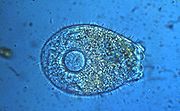- Protozoa
-
Protozoen (Einzahl: Protozoon, [alt]griechisch πρωτόζωο[ν], protózoo[n], „das erste Tier“, von πρώτο, próto, „das erste“ und ζώο[ν], zóo[n], „das Tier, das Lebende“) oder Urtiere ist eine veraltete Bezeichnung für aufgrund ihrer heterotrophen (vereinzelt auch autotroph) Lebensweise und ihrer Mobilität als tierisch angesehene Einzeller, die keine Zellwand und im Gegensatz zu Bakterien einen Zellkern besitzen. Karl Grell definiert sie als Eukaryoten (einen oder mehreren Zellkernen), welche als Einzelzellen leben oder koloniale Verbände bilden.
Inhaltsverzeichnis
Unterscheidung Protozoa – Protist
Zunächst stellte man die Protozoen zusammen mit anderen kernhaltigen Einzellern in ein eigenes Reich der Lebewesen, nämlich ins Reich der Protista. Die Begriffe „Protozoen“ und „Protista“ sind ebenso wenig systematische Taxa wie die Begriffe „Algen“, „Amöben“ oder „Flagellaten“, da die Einteilung hauptsächlich aufgrund von ins Auge springenden Merkmalen, dem so genannten Habitus getroffen wurde und nicht aufgrund natürlicher Verwandtschaft, über die damals noch nichts bekannt war.
Die Bezeichnung wurde von dem deutschen Zoologen Georg August Goldfuß 1818 in die Wissenschaft eingeführt. Die wissenschaftliche Disziplin, die sich mit der Erforschung der Protozoen beschäftigt, wird als Protozoologie bezeichnet. Die Erforschung der Protisten bezeichnet man als Protistologie. Nach heutigem Verständnis ist die Protozoologie eine Teilmenge der Protistologie.
Systematik
Die in der Wikipedia verwendete Systematik ist die Systematik der Eukaryoten von Adl et al. (2005)[1].
Siehe auch
Literatur
- Wilfried Westheide, Reinhard Rieger (Hrsg.): Spezielle Zoologie. Teil 1: Einzeller und Wirbellose Tiere. 2. Auflage. Spektrum Akademischer Verlag, Heidelberg 2006, ISBN 3-8274-1575-6
- Karl G. Grell: Protozoologie. 2. Auflage. Springer-Verlag, Berlin, Heidelberg, New York 1968
Einzelnachweise
- ↑ Sina M. Adl, Alastair G. B. Simpson, Mark A. Farmer, Robert A. Andersen, O. Roger Anderson, John A. Barta, Samual S. Bowser, Guy Bragerolle, Robert A. Fensome, Suzanne Fredericq, Timothy Y. James, Sergei Karpov, Paul Kugrens, John Krug, Christopher E. Lane, Louise A. Lewis, Jean Lodge, Denis H. Lynn, David G. Mann, Richard M. McCourt, Leonel Mendoza, Øjvind Moestrup, Sharon E. Mozley-Standridge, Thoams A. Nerad, Carol A. Shearer, Alexey V. Smirnov, Frederick W. Spiegel, Max F. J. R. Taylor: The New Higher Level Classification of Eukaryotes with Emphasis on the Taxonomy of Protists. The Journal of Eukaryotic Microbiology 52 (5), 2005; Seiten 399–-451 (Abstract und Volltext)
Wikimedia Foundation.

